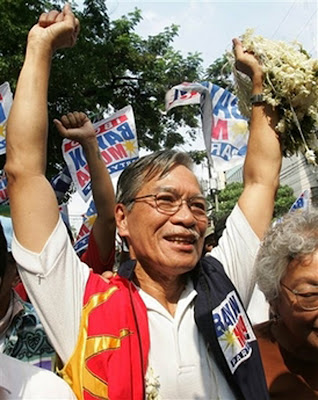Wednesday, June 30, 2010
paalam sampaguita
Saturday, April 24, 2010
Corrupt Governors candidacy been disqualified
The Commission on Elections (COMELEC) First Division on Monday declared Lakas-Kampi-CMD 2nd congressional district candidate Samar Governor Milagrosa Tan disqualified to run due to a question on her citizenship.
| |
In a 6-page Resolution penned by Commissioners Armando Velasco, Gregorio Larrazabal, and presiding Commissioner Rene Sarmiento, the COMELEC First Division on its April 19, 2010 promulgation said that “Respondent MILAGROSA TEE TAN is hereby DECLARED a naturalized Philippine citizen NOT QUALIFIED to be a candidate for the position of Member of the House of Representatives for the Second District of Samar.”
The decision was based on a two separate petition for disqualification filed before the COMELEC by Carlo L. Gabon and Oscar E. Garcia against Respondent Samar governor Milagrosa Tee Tan to run as a member of the House of Representatives alleging that Tan is a naturalized (not natural-born) Filipino citizen.
Article VI, Section 6 of the 1987 Constitution states that “No person shall be a Member of the House of the Representatives unless he is a natural-born citizen of the Philippines…”
Petitioners Gabon and Garcia submitted to the Commission copies of the Respondent’s Application for Naturalization dated October 12, 1976 filed by her father, her verified Alien Certificate of Registration, and a certified true copy of Certificate of Naturalization dated April 20, 1978 issued to Tan, among other things, proving that the Respondent is NOT a natural-born Filipino citizen.
Likewise, Petitioners submitted to the COMELEC the Commission’s own Decision in 2005 in the case of Auguis vs. Tan where the Commission held that Tan’s Certificate of Naturalization “cannot be collaterally attacked, and that Tan, being a NATURALIZED Filipino citizen, is qualified to run as a Governor for the Province of Samar”. Petitioner Garcia pointed out that the Commission’s Decision on Auguis is conclusive as to the status of Tan’s citizenship.
In the April 19, 2010 Resolution, the Division said that “Tan’s father is Chinese while her mother is a natural born Filipino. Tan’s father eventually applied for naturalization as a Filipino in 1975 and was issued a Certificate of Naturalization in 1976. Thereafter, he applied for naturalization of his children, which included Tan.”
The Division resolves that Petitioners Gabon and Garcia have submitted sufficient evidence which tend to show that, indeed, Tan is merely a naturalized Filipino and found out that “…Tan does not possess the legal qualifications to run for a seat in the House of the Representatives.”
Thursday, April 15, 2010
Plataporma ni Liza Maza
M - Makabayang ekonomiya: Pagsusulong ngtunay na reporma sa lupa at maunlad na agrikultura; pambansangindustriyalisasyon; insentibo sa negosyanteng Pinoy; pagbasura sa AutomaticDebt Appropriation; mataas na badyet sa batayang serbisyo.
A – Abot-kayang bilihin at serbisyo:Pagkain at gamot; serbisyong pangkalusugan; edukasyon; pabahay.
S – Sahod na nakabubuhay at seguridad satrabaho: Itaas ang sahod ng manggagawa; pagregularisa ng mga kontraktwal;karampatang benepisyo; proteksyon sa pondo ng GSIS at SSS members.
A – Aksyon para sa karapatan at kagalinganng mga kababaihan: Proteksyon laban sa karahasan, pang-aabuso atdiskriminasyon; pagpapaunlad ng kabuhayan; pantay at makabuluhangrepresentasyon at partisipasyon sa gobyerno.
plataporma ni ka satur






Satur C. Ocampo aims to be the voice of equal opportunity in the Senate. He is committed to working for the upliftment of the poor and marginalized in Philippine society: the farmers, workers, fisherfolk, urban poor, indigenous peoples, women, youth, employees and Filipino entrepreneurs.
He vows to bring back to the Senate the nationalist legacy of former Senators Claro M. Recto, Jose W. Diokno and Lorenzo M. Tanada.
Satur also hopes to pursue in the Senate his long-time advocacy for peace and human rights.
1. Uplift the poor and marginalized
Work for the upliftment of the economic conditions and dignity of the truly poor and marginalized:
- ensure the workers' right to a secure job and a living wage, including a stop to unjust labor contracting schemes;
- put a stop to unbridled demolitions of the homes and livelihoods of the poor;
- enact a universal health care policy that would provide free hospitalization to children and the elderly, reverse the devolution of health services, bring down prices of medicines, and expand coverage of PhilHealth;
- expand free legal services for poor litigants;
- guarantee tertiary education for poor students through a comprehensive scholarship and study now pay later policy;
- empower the poor and marginalized by respecting their rights and providing greater representation and participation in Congress, local government units and other government agencies.
Pursue a nationalist economic policy and a government that is truly accountable to the people and serves the national interest above all:
- develop the countryside through genuine agrarian reform, effective support and subsidies to farmers and the adoption of modern and sustainable farming technologies;
- protect, support and subsidize Filipino industries as well as review and correct unfair and anti-Filipino trade policies (e.g. liberalization, deregulation and privatization);
- ensure the development of a self-reliant and competitive domestic economy;
- repeal the automatic appropriations policy on debt and rechannel the debt service budget to social services and national development
- hold Mrs. Arroyo and her officials accountable for their acts of plunder, electoral fraud, human rights violations and other crimes even as policies are to be put in place ensuring greater transparency and accountability in government;
- pursue an independent foreign policy by, among others, abrogating the RP-US Visiting Forces Agreement, the Mutual Defense Treaty and other one-sided agreements with other countries and foreign entities.
Pursue a peace policy that seeks to resolve the roots of the armed conflict:
- address the roots of the armed conflict through the resumption of the peace talks and/or implementation of previous agreements with the NDF, MILF and MNLF;
- implement the UN Special Rapporteur's recommendations on the extrajudicial killings, enforced disappearances and other human rights atrocities;
- compensate the martial law human rights victims and indemnify all other human rights victims;
- free all political prisoners.





